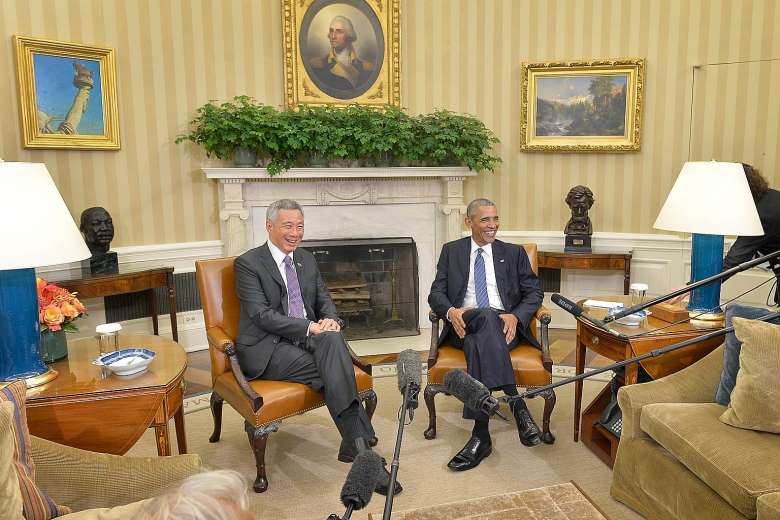The Trans-Pacific Partnership (TPP) trade agreement would help the United States secure its economic interests and its place in the world, Prime Minister Lee Hsien Loong told US officials and business leaders in Washington, DC, urging them to lend their voices to support the deal.
Speaking at a reception hosted by the US Chamber of Commerce and US-ASEAN Business Council on Monday, Mr Lee acknowledged that the politics is difficult in an election year but said that ratification of the 12-nation pact would be a “clear statement” of US “commitment and confidence in our region“.
“Asian countries want America to be engaged. We need to know that this engagement will be sustained and we need to know that agreements will be upheld and that Asia can depend on America,” he said.
He also dismissed the idea of re-negotiating the deal, saying that “every one of the TPP signatories has had to make sacrifices in order to accept the TPP agreement”.
“Nobody wants to re-open the process, with no prospect of doing better and every chance of having it fall apart,” he said.
The landmark trade deal, which includes countries such as Singapore, the US, Japan and Malaysia, was agreed to last year after a prolonged negotiation process. The deal now awaits ratification by the domestic legislatures of the participating nations.
Given that this is an election year in the US, ratification by the US Congress has long been considered among the most uncertain. Both Republican presidential nominee Donald Trump and Democratic presidential nominee Hillary Clinton have said they oppose the deal.
President Barack Obama, however, told The Straits Times in an interview that he “remains committed” to the trade pact.
Reiterating the many strategic and economic advantages that the deal holds for the US, Mr Lee said: “Improved market access will mean cheaper products for consumers and more exports for manufacturers. Incorporated in the TPP are provisions on human rights, intellectual property protection and safeguards for labour and the environment. There will be strong standards that will support innovation and benefit many US technology giants.”
Strategically, he said, the deal would add substance to the US rebalance to Asia, which he stressed cannot be just about the military and the Seventh Fleet of the US Navy. “There are no winners, only losers with protectionism. Economic development across the world will be blocked; less interdependence means the clear advantage of co-operation and interdependence over conflict and war will be weakened,” he said.
He then added: “As Americans say, you have to be at the table, or be on the menu.”
Responding to a question on China’s position on its claims in the South China Sea after the international tribunal ruling last month, Mr Lee said he did not think the Chinese had changed their policy as a result of the decision.
Once countries have taken positions, to have them “walk back from those and say ‘well, it’s not quite so absolute and it wasn’t so clearly mine after all’, I think we have to wait a long time to see that happening – very few countries do it”, he said.
He added, though, that he did not think any of the claimant countries would want to “push it to the brink”. “They have interests, they have claims, they would want to maintain them, but nobody wants to go to war,” he added.
Earlier, Mr Lee met US Treasury Secretary Jacob Lew, Defence Secretary Ash Carter and Commerce Secretary Penny Pritzker.
Reas also: President Obama welcomes PM Lee at White House for special talks
He also laid a wreath at the Tomb of the Unknown Soldier in Arlington National Cemetery.
A 19-gun salute rang out and Singapore’s national anthem was played by a military band as he arrived. To mark his visit, Mr Lee presented a memento – a figurine of a soldier against the Singapore flag – which he said in a Facebook post “symbolises the warm friendship and strong defence ties shared between Singapore and the US”.
Following the wreath-laying, Mr Lee was received at the Pentagon with an enhanced honour cordon featuring all five branches of the US military. A US military band played Majulah Singapura before the Prime Minister and Mr Carter.
Both the Arlington cemetery and the Pentagon are in Virginia state and about 10 minutes’ drive from the White House in Washington, DC.
The two military ceremonies set the tone for an official visit by Mr Lee that features ceremonies reserved for the US’ closest partners.
Around the White House, streets were lined with Singapore and US flags, and two large flags also adorned the ornate Eisenhower building that houses the offices of the US administration staff.
On the sidelines of Mr Lee’s visit, a memorandum of understanding was signed between Singapore and the US to establish a platform to help companies from both countries work together to pursue opportunities in third-party markets.
The climax of the visit is the state dinner on Tuesday night (this morning, Singapore time) in Washington.

This article was first published on Aug 03, 2016.
Get a copy of The Straits Times or go to straitstimes.com for more stories.


























































































































